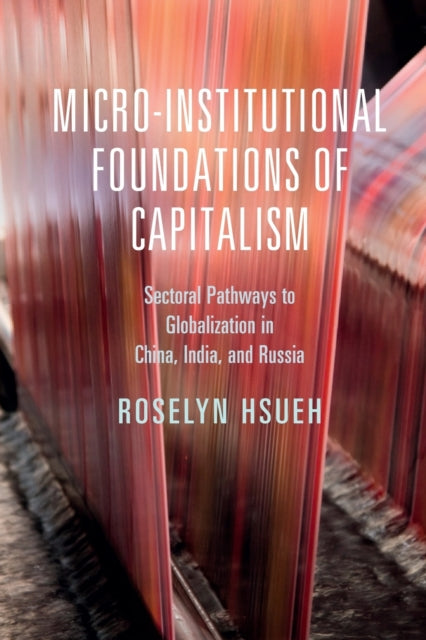RoselynHsueh
Micro-institutional Foundations of Capitalism
Micro-institutional Foundations of Capitalism
YOU SAVE £1.15
- Condition: Brand new
- UK Delivery times: Usually arrives within 2 - 3 working days
- UK Shipping: Fee starts at £2.39. Subject to product weight & dimension
Bulk ordering. Want 15 or more copies? Get a personalised quote and bigger discounts. Learn more about bulk orders.
Couldn't load pickup availability
- More about Micro-institutional Foundations of Capitalism
Micro-institutional Foundations of Capitalism explores the relationship between internal development, integration into the global economy, state-market relations, and their significance in the post-cold war era. It introduces a new theory of sectoral pathways to globalization and development, highlighting the role of state elites, sectoral structures, and organization of institutions in determining market governance patterns.
Format: Paperback / softback
Length: 200 pages
Publication date: 30 June 2022
Publisher: Cambridge University Press
The relationship between internal development and integration into the global economy in developing countries is a complex and multifaceted issue that requires a comprehensive analysis. In this essay, we will explore the various factors that contribute to this relationship and examine the ways in which state-market relations differ in developing countries. We will also discuss the importance of these differences in the post-cold war era of global conflict and cooperation.
Internal development refers to the process of economic, social, and political transformation within a country. It involves the improvement of infrastructure, the expansion of education and healthcare, and the promotion of economic growth and employment. Integration into the global economy, on the other hand, involves the participation of developing countries in the international trade and financial system. This can be achieved through trade agreements, foreign investment, and the adoption of international standards and regulations.
State-market relations in developing countries are shaped by a variety of factors, including historical legacies, cultural traditions, and political institutions. In some countries, the state plays a dominant role in the economy, while in others, the market is more dominant. In addition, the level of economic development and the level of political stability also play a significant role in determining state-market relations.
One of the key differences between state-market relations in developing countries and developed countries is the role of the state in the economy. In developed countries, the state plays a limited role in the economy, with the market being the primary driver of economic growth. In contrast, in developing countries, the state often plays a more active role in the economy, through the implementation of policies and regulations that promote economic development and protect domestic industries.
Another difference is the level of economic regulation. In developed countries, the government has implemented a comprehensive set of regulations that protect consumers, workers, and the environment. In contrast, in developing countries, the level of economic regulation is often less stringent, which can lead to increased competition and economic instability.
State-market relations also differ in terms of the role of the private sector. In developed countries, the private sector is often seen as a key driver of economic growth and innovation. In contrast, in developing countries, the private sector is often limited by government regulations and subsidies, which can limit its ability to compete with foreign companies.
The relationship between internal development and integration into the global economy in developing countries is complex and multifaceted. While integration into the global economy can provide opportunities for economic growth and development, it can also lead to increased competition and economic instability. State-market relations play a critical role in determining the success of developing countries in integrating into the global economy.
In conclusion, the relationship between internal development and integration into the global economy in developing countries is a complex and multifaceted issue that requires a comprehensive analysis. State-market relations differ in developing countries due to historical legacies, cultural traditions, and political institutions. The level of economic development and the level of political stability also play a significant role in determining state-market relations. While integration into the global economy can provide opportunities for economic growth and development, it can also lead to increased competition and economic instability. Therefore, it is important for developing countries to strike a balance between promoting internal development and integrating into the global economy. This can be achieved through the implementation of policies and regulations that promote economic development and protect domestic industries, while also promoting competition and innovation.
Weight: 638g
Dimension: 151 x 228 x 30 (mm)
ISBN-13: 9781108459037
This item can be found in:
UK and International shipping information
UK and International shipping information
UK Delivery and returns information:
- Delivery within 2 - 3 days when ordering in the UK.
- Shipping fee for UK customers from £2.39. Fully tracked shipping service available.
- Returns policy: Return within 30 days of receipt for full refund.
International deliveries:
Shulph Ink now ships to Australia, Belgium, Canada, France, Germany, Ireland, Italy, India, Luxembourg Saudi Arabia, Singapore, Spain, Netherlands, New Zealand, United Arab Emirates, United States of America.
- Delivery times: within 5 - 10 days for international orders.
- Shipping fee: charges vary for overseas orders. Only tracked services are available for most international orders. Some countries have untracked shipping options.
- Customs charges: If ordering to addresses outside the United Kingdom, you may or may not incur additional customs and duties fees during local delivery.


